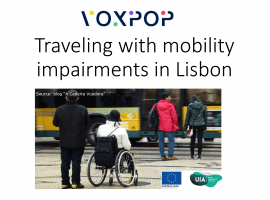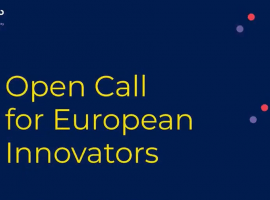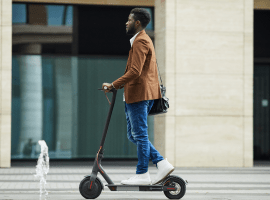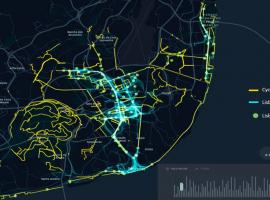Trends on EU Urban mobility data sharing platforms: the digital transition of the cities’ mobility system
Background
In the last ten years, efforts have been made by the European Commission and the European Parliament to create EU policies at a local level. In this framework, the project VoxPop is working towards strengthening the urban dimension of EU policies. The VoxPop ambition is to accelerate the digital transition of the city's mobility system with the development of a more collaborative model of city management, supported by digital tools allowing more efficient planning, operation and maintenance of the transport infrastructure and, simultaneously, the creation of mobility solutions more focused on the people who actually use these solutions, and, as a result, improve the quality of life in the city of Lisbon.
The project aims at translating multi-party data into actionable intelligence through the creation of a sustainable and responsible public and private data-sharing ecosystem. To that effect, VoxPop is creating an Urban Access Point (UAP) to interconnect the various existing management systems. Following a “System of Systems” approach, the UAP will be a non-discriminatory facilitator between the different marketplace participants, while providing the trustworthiness of an impartial data gatekeeper. The creation of this tool will unlock the value of data through the integration of demand data, asset information, and service supply data, with a collaborative data-sharing model across stakeholders.
Previously to the development of the UAP, desk research was carried out on a set of case studies to understand needs in other EU cities, current standards, and trends in urban platforms. The goal is to keep up with the already existing data platforms and be aware of the latest developments, keeping the information up to date.
Platforms similar to an “Urban Access Point” on a European level
Cities have recognized the value of big data and how it can be helpful to share it for solving problems, creating innovative solutions, and promoting sustainability and safety. Also, urban data is crucial to improve MaaS applications and help not only citizens but also every person who is visiting the city, which creates great value for tourism and therefore for the city economy.
Thus, some cities have/are already developing platforms where this kind of data is fed into, processed, and shared among the general public.
The desk research on urban platforms was conducted between December 2020 and March 2021 and analysed 14 platforms from the following 10 countries: Netherlands, Denmark, Spain, United Kingdom, Finland, Germany, France, Norway, Belgium, and Ireland.
Results
A detailed analysis was pursued for each platform. The extracted information, which will serve as the basis for the design of other systems’ architectures, and to define their main needs and overall requirements, can be organised according to the following conditions:
- Types/categories of data provided
- Data sources
- How is the data provided to users
- How is the data updated (frequency)
- Who can get access to the data
- Quality control mechanism
- Operational state
This research showed the information given by urban platforms is mostly related to traffic, parking, shared mobility (especially bike-sharing), public transport, signalization and policies, and areas or services of interest. Furthermore, the European cities are sharing data mainly with the large public and free of charge, however, some datasets contain sensitive content and cannot be provided to every and, consequently, have restricted access. Also, it was possible to identify two distinct perspectives concerning the frequency of data exchange: on one hand, some platforms only provide static information, more or less recent; on the other hand, the future of smart cities depends not only on the quality of data but on how updated it is and for that, dynamic and real-time data exchange is fundamental. While the first is mostly supplied by municipalities and local authorities, to acquire real-time data it is necessary to make use of technologies such as sensors, placed in strategic locations and more recently, by making use of the potentiality of moving devices such as smartphones or in-vehicle equipment.
Besides the challenges raised by data collection, great issues are raised when it comes to sharing data with the users. It was verified that not all cities are following the same standards and most information is published in distinct formats instead of using a single standardised form. It is important to have in mind that these platforms should assure the interoperability of data among the ecosystem actors, and also they should feed their respective National Access Points (NAPs). The prescribed data format for the NAPs is DATEX II, which is a data exchange standard with motorway origins, however, its application to other roads (including urban and rural roads) is under consideration in a potential revision of the regulation. Thus, cities are encouraged to produce data in formats that are consistent with the regulations.
For the quality control, generally, the platforms have a team responsible for monitoring the data and assure its highest possible quality and integrity. Nonetheless, in some cases, the service provider claims that it is not responsible for the accuracy of the information or gives the responsibility to the data supplier.
Finally, it was possible to identify that most platforms were launched in the first half of the 2010 decade. Yet, more recent platforms were created in the last few years and are still being created and developed.
Conclusions and next steps
This research focused on finding and exploring platforms created on a European level to gather and provide urban mobility-related information. The existing platforms are numerous, and it is impossible to explore them all in a single document. In this framework, a report[1] was conducted to provide a general overview, presenting detailed information on some of the frontrunners in sharing data and developing smart and shared mobility in Europe.
It was realised that becoming “smarter” is of the utmost importance among European cities. Cities have recognised the value of big data and how it can be helpful to share it for solving problems, creating innovative solutions, and promoting sustainability and safety. Also, urban data is crucial to improve MaaS applications and help not only citizens but also every person who is visiting the city, which creates great value for tourism and therefore for the city economy.
The UAP will have into consideration the main findings of this research and will be a key point for the city of Lisbon to unlock and manage access to public and private data sets. This will increase the efficiency of the urban mobility system by enhancing the effectiveness of the mobility services provided which will contribute to the quality of life in the city, with a more competitive local economy, and promoting the development of greener mobility solutions.

[1] https://www.voxpoplisboa-en.pt/uploads/8/0/5/3/80533238/urban_acess_point_-_market_research.pdf

























